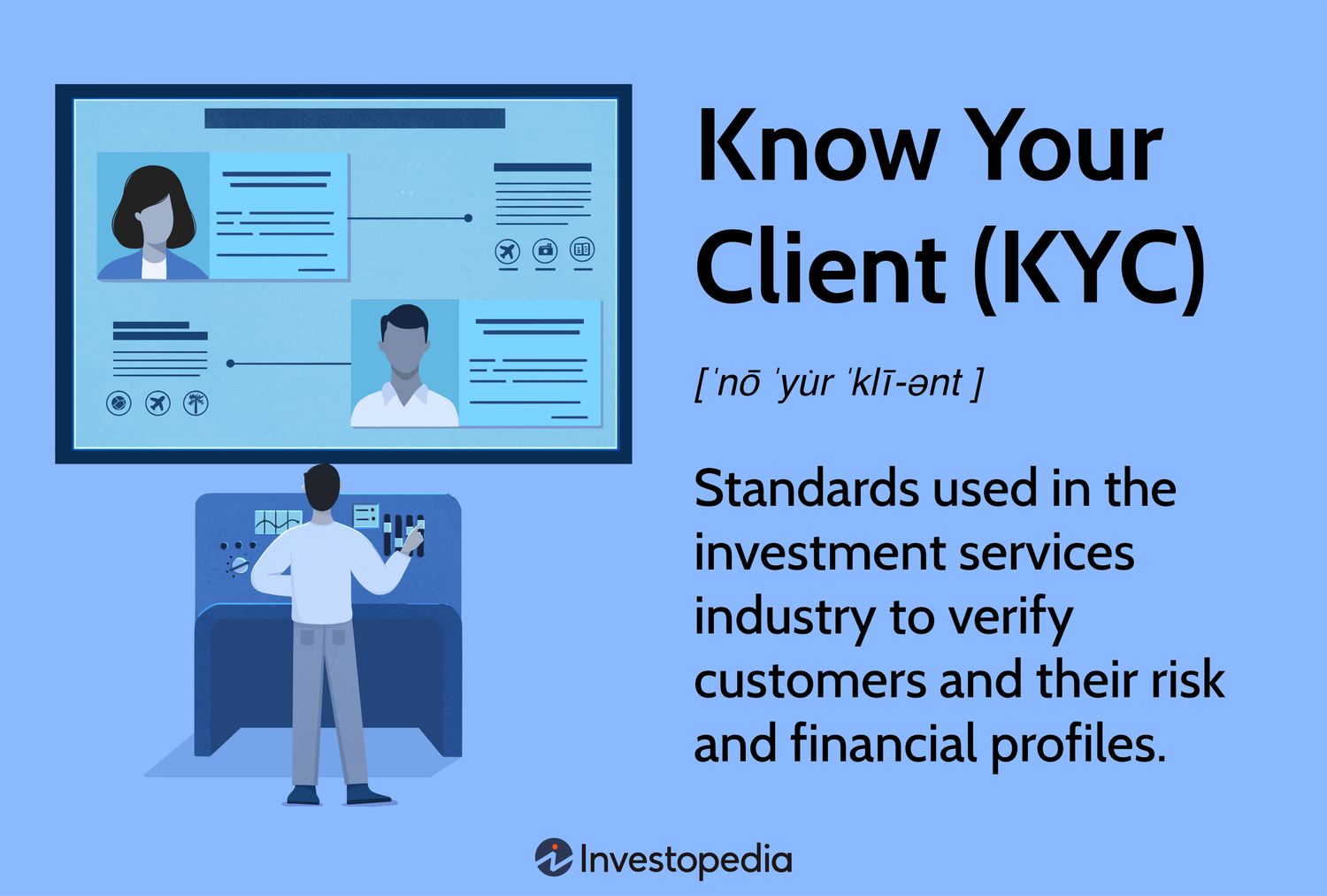What Is Know Your Client (KYC)?
Know Your Client (KYC) is a standard in the investment industry that ensures advisors can verify a client's identity and know their client's investment knowledge and financial profile.
Three components of KYC include the customer identification program (CIP), imposed under the USA PATRIOT Act in 2001, customer due diligence (CDD), and ongoing monitoring or enhanced due diligence (EDD) of a customer's account once it is established.
Key Takeaways
- Know Your Client (KYC) is a standard used in the investment and financial services industry to verify customers and know their risk and financial profiles.
- Three components of KYC include the customer identification program (CIP), customer due diligence (CDD), and enhanced due diligence (EDD).
- The SEC requires that each new customer provide detailed financial information before opening an investment or banking account.
Understanding Know Your Client (KYC)
The Know Your Client (KYC) rule is an ethical requirement for those in the securities industry dealing with customers during the opening and ongoing maintenance of accounts.
It is implemented at the onset of the customer-broker relationship to establish the essential personal profile of each customer before any financial recommendations are made. The customer is also made aware of the need to comply with all the laws, regulations, and rules of the securities industry.
KYC Requirements
Customer Identification Program
CIP requires that financial firms obtain four pieces of identifying information about a client, including name, date of birth, address, and identification number.
Customer Due Diligence
CDD is a process in which all of a customer’s credentials are collected to verify their identity and evaluate their risk profile for suspicious account activity.
Enhanced Due Diligence
EDD is used for customers that are at a higher risk of infiltration, terrorism financing, or money laundering and additional information collection is often necessary.
KYC Compliance
Two rules governing KYC include Financial Industry Regulatory Authority (FINRA) Rule 2090 (Know Your Customer) and FINRA Rule 2111 (Suitability).
FINRA Rule 2090 requires every broker-dealer to use reasonable diligence when opening and maintaining client accounts and to know and keep records on the profile of each customer, as well as identify each person who has the authority to act on the customer’s behalf.
FINRA Rule 2111 notes that a broker-dealer must have a reasonable basis to believe that a recommendation is suitable for a customer based on the client’s financial situation and needs. This rule assumes that the broker-dealer has completed a review of the current facts and profile of the customer, including the customer’s other securities and investments before making any purchase, sale, or exchange of a security on the client's behalf.
AML and KYC
The U.S. Financial Crimes Enforcement Network (FinCEN) requires both customers and financial institutions to comply with KYC standards to prevent illegal activity, specifically money laundering. AML, anti-money laundering, is a term for the range of measures and processes used to achieve regulatory compliance. KYC is a component of AML.
FinCEN requires financial institutions to understand the type and purpose of the customer relationship and develop a customer risk profile, used as a baseline for detecting suspicious customer activities.
Financial institutions must also maintain current and accurate customer information and continue to monitor accounts for suspicious and illegal activities. When detected, they are required to promptly report their findings.
KYC and Cryptocurrency
The cryptocurrency market is praised for providing a decentralized medium of exchange that promotes confidentiality. However, these benefits also present challenges in preventing money laundering. Criminals see cryptocurrency as a vehicle to launder money and as a result, governing bodies are looking for ways to impose KYC on cryptocurrency markets.
Most cryptocurrency platforms are considered money services businesses (MSBs) and must comply with anti-money laundering (AML) laws, which require customer identification programs and certain reporting and recordkeeping procedures.
Fiat-to-crypto exchanges facilitate transactions involving fiat currencies and cryptocurrencies. Since fiat currency is the official currency of a nation, most of these exchanges employ a measure of KYC and financial institutions would have vetted their customers according to KYC requirements.
$60 million
The penalty assessed against Bitcoin mixer Larry Dean Harmon for violating anti-money laundering laws.
In Dec. 2020, FinCEN proposed that cryptocurrency and digital asset market participants submit, maintain, and verify customers' identities. This rule classifies certain cryptocurrencies as monetary instruments, subjecting them to KYC requirements. The proposed rule is slated for final action in Feb. 2024.
What Is KYC Verification?
The Know Your Client (KYC) verification is a set of standards and requirements used in the investment and financial services industries to ensure brokers have sufficient information about their clients, their risk profiles, and their financial position.
What Is KYC in the Banking Sector?
KYC in the banking sector requires bankers and advisors to identify their customers, beneficial owners of businesses, and the nature and purpose of customer relationships. Banks must also review customer accounts for suspicious and illegal activity and maintain and ensure the accuracy of the customer accounts.
What Are KYC Documents?
Account owners generally must provide a government-issued ID as proof of identity. Some institutions require two forms of ID, such as a driver's license, birth certificate, social security card, or passport. In addition to confirming identity, the address must be confirmed. This can be done with proof of ID or with an accompanying document confirming the address of the client.
The Bottom Line
Know Your Client (KYC) is a set of standards and requirements investment and financial services companies use to verify the identity of their customers and any associated risks with the customer relationship. KYC requires customers to provide a personal identification profile and KYC ensures investment advisors are aware of their client's risk tolerance and financial position.
:max_bytes(150000):strip_icc()/photo__james_chen-5bfc26144cedfd0026c00af8.jpeg)
:max_bytes(150000):strip_icc()/DavidRubinbiophoto-720c26a0862f4b3e86e1d2036ffcf10f.jpg)

:max_bytes(150000):strip_icc()/AML-7a3c35887ed946d1ba9cb56fae105db5.jpg)
:max_bytes(150000):strip_icc()/GettyImages-14180390771-2662e9d591c543b2aa04b96f957eec2b.jpg)
:max_bytes(150000):strip_icc()/shutterstock373543888vc-5bfc2b2dc9e77c005143e0d5.jpg)
:max_bytes(150000):strip_icc()/white-collar-crime.asp-final-0d425248c84a4238b41dc536286d81ac.jpg)
:max_bytes(150000):strip_icc()/GettyImages-1329759358-5dbcdfbb109c4bfdbc400c8ff0ca8084.jpg)
:max_bytes(150000):strip_icc()/CryptoSpotlight-Recirc2-52a72e7b82124c83b1818c6f4fa14344.jpg)